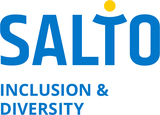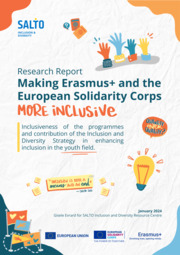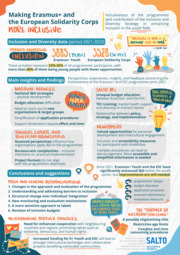Inclusion & Diversity in EU youth programmes
How to make EU youth programmes more inclusive?
- In 2023, an interim evaluation of the Erasmus+ and European Solidarity Corps programmes period 2021-2023 was initiated, and the report will be published in December 2024.
- If you wish to find out more about the inclusiveness of the programmes and the contribution of the Inclusion and Diversity Strategy in enhancing inclusion in the youth field in this interim period, have a look at the research report, conducted by SALTO ID (published in January 2024)
- If you wish to focus more on the main findings, check the executive summary of the research report "Making Erasmus+ and the European Solidarity Corps more inclusive".
- Find a visual summary of the report here!
- For more background information and analysis of past successes and ongoing challenges, check the desk research, which supports identifying current and past (2014-2020) programmes' strengths and weaknesses and compiling lessons learnt for the future European youth programmes, beyond 2027. The executive summary of the desk research is available here.
Inclusion and Diversity data (period 2021-2023)
- Within the Erasmus+: Youth in Action programme, 3.885 or 24.05% of projects indicated that they addressed the priority of inclusion. In the European Solidarity Corps, that focus represents 3.528 or 56,49% of the projects.
- These activities represent 22%-25% of all programmes’ participants, with more than 40% of them being young people with fewer opportunities.
Previous analysis done by SALTO I&D
- check our vision paper on ID beyond 2020 (October 2019)
- the report of an expert seminar (April 2019, Mainz-Germany) and the main findings of an online surcey conducted by SALTO ID


